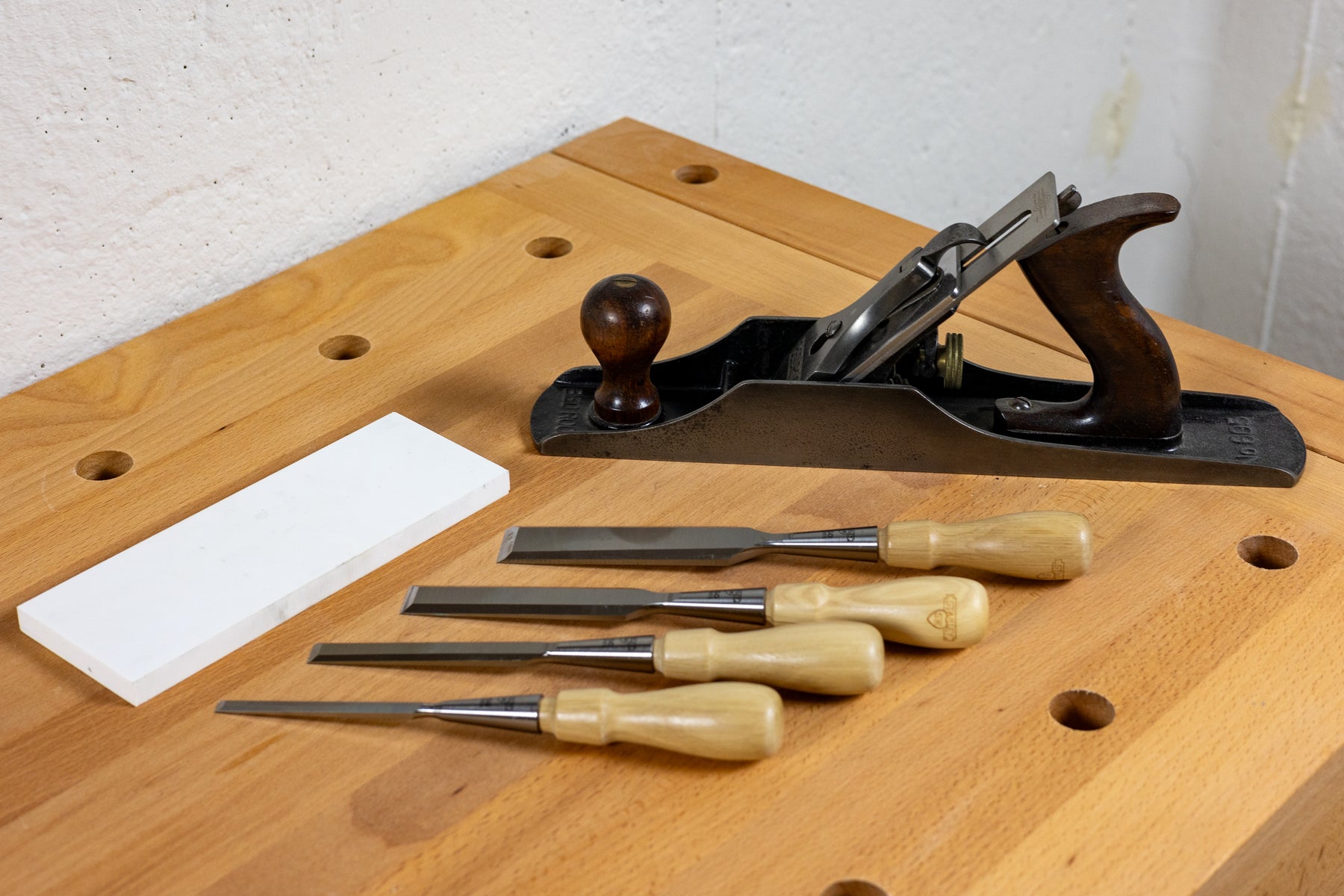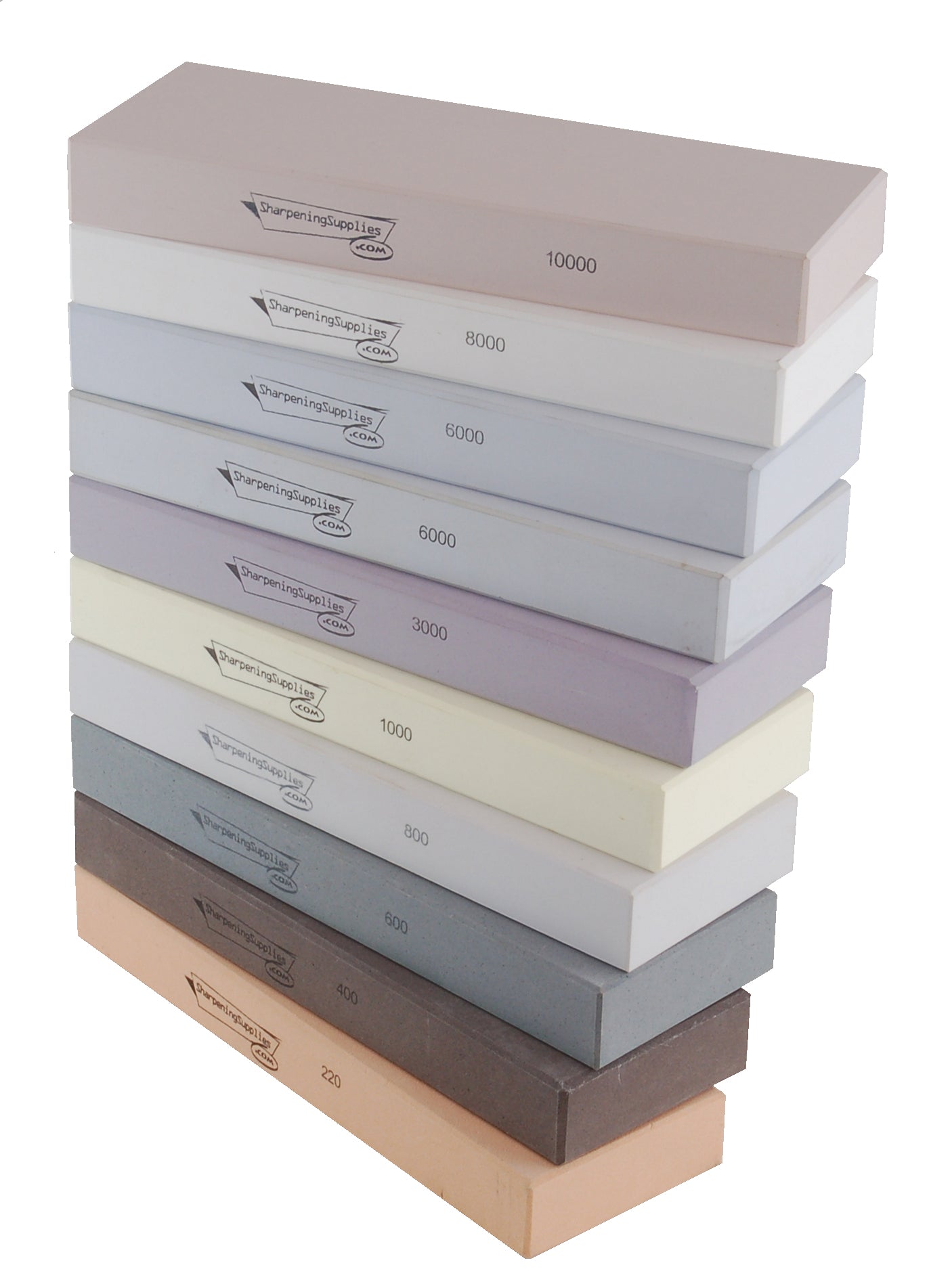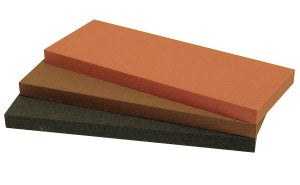Selecting the Right Stone for Chisels and Planes

Selecting the Right Stone for Chisels and Planes
With so many types of stones for sharpening, it can be difficult to determine what the best stone is for your woodworking needs. Fortunately, the variety of stone materials will allow you to select a material that will meet your needs and stay within your budget.
The three main types of bench stones are water stones, diamond stones, and oil stones. Since every woodworker’s needs and preferences are different, understanding the advantages of each stone will allow you to be a more informed purchaser of sharpening stones.
Waterstones

Water stones have become very popular among woodworkers because they cut fast and are available in a wide range of grits. Like the oil stones, water stones are available in both a man-made and a natural variety. However, man-made water stones are significantly more popular.
Most water stones are made of aluminum oxide abrasive. While this is the same type of abrasive material as used in some other stones like oil stones, the stones are quite different. First, water stones use water to remove the swarf. Using water makes it easier to clean up and more convenient to use. Secondly, water stones cut faster than comparable oil stones because the binding material that holds the stone together is softer. The softness of the stone allows the stone to cut faster because sharp new material is constantly being uncovered. However, the softness can be a disadvantage of the water stone because it must be flattened. Flatness is particularly important for woodworking tools like chisels and plane irons.
When selecting a water stone, you'll find that they are available in a very wide range of grits, from the very coarsest to the very finest grits. This makes them particularly suited to sharpening plane iron and chisels since the tools can be quite dull and require a very coarse grit, but also require finest edges requiring extremely fine grits.
Advantages of Water Stones
- Fast Cutting - With thick edges, woodworking tools can take longer to sharpen so cutting speed is important.
- Widest Range of Grits - Water Stones are available in the widest range of grits.
- Uses Water - Water is more available and less messy than oil.
Disadvantages of Water Stones
- Require Flattening - Water stones do require flattening. However, there is one silver lining, they can be flattened easily with a flattening stone.
Diamond Stones

Diamond stones are very popular for woodworkers. Unlike oil and water stones, diamond stones never need flattening. Diamond stones use diamond on a metal backing, this backing is produced flat and stays flat for the lifetime of the stone.
The diamond stone can be extremely versatile. It can be used to sharpen any woodworking tool. It can even sharpen carbide-tipped router bits. Carbide is too hard for the abrasives found in water or oil stones.
Diamond stones are the easiest stones to maintain. They never require flattening or any prep. Simply splash water on them to use them and dry them off when you're done sharpening.
Like the water stone, diamond stones use water to remove the swarf.
Advantages of Diamond Stones
- Fastest Cutting - Diamond stones are the fastest cutting stones.Speed is important when sharpening woodworking tools.
- Stay Flat - Diamond stones are flat. They are so flat that the coarsest ones can even flatten water stones.
- Uses Water - Water is more available and less messy than oil.
Disadvantages of Diamond Stones
- Limited Grit Range - Diamond stones are commonly available in grits up to 1200 grit. (DMT makes an Dia-Sharp 8000 grit stone.)
Oil Stones

Oil stones are the traditional stones that have been popular for years. Today they are available in man-made and natural stones. The man-made stones are made of either silicon carbide or aluminum oxide abrasives. These are generally available in coarse, medium, and fine grades. The natural stones are made of novaculite (called Arkansas stones) and are available in grades such as Soft Arkansas, Hard Arkansas, and Hard Translucent Arkansas; the harder the grade, the finer the grit of the stone. The natural stones are generally finer grits than the man-made stones so it is common to have both man-made and natural oil stones in your sharpening kit.
While these traditional stones have their purpose, they are not as popular among woodworkers.
As the name suggests, oil stones use oil as a lubricant and to remove the swarf to keep the stone from getting glazed. The oil used is a honing oil designed for sharpening.
Advantages of Oil Stones
- Cost - Oil stones are the most economical sharpening stones.
- Stay Flat Longer - Oil stones do stay flat longer than water stones. However, once they are no longer flat, they are not as easy to flatten.
Disadvantages of Oil Stones
- Slower Cutting - When compared to similar grits, oil stones are the slower than diamond or water stones.
- Limited Grit Range - Man made oil stones are generally available in 120 to 400 grit. For finer grits, you must switch to Arkansas stones.
Choosing a Hybrid Option
It isn't critical to stick to only one type of stone. Another option is to choose the best qualities of each stone and use them to your advantage. The diamond stone works so well on coarse work because it cuts aggressively and stays flat. The water stone is great for putting on the final edge. For example, a coarse/fine diamond stone (325/600 grit) combined with a very fine 4000 and 8000 water stone works well for plane irons and chisels. Both water stones and diamond stones use water so they're very compatible with one another.
